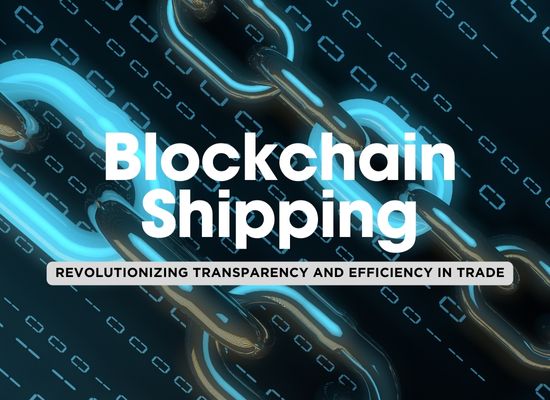Smart Contracts, Smarter Shipping: Blockchain’s Big 8 Roles in Maritime Trade

The maritime shipping industry has long grappled with inefficiencies, security challenges, and a lack of transparency. Blockchain technology is emerging as a transformative solution to these issues, offering a secure, decentralized, and immutable ledger for transactions and data. From streamlining cargo tracking to automating trade agreements, blockchain is poised to reshape the maritime landscape.

1. Streamlining Cargo Tracking with Blockchain 📦
Efficient cargo tracking is a cornerstone of global trade, but traditional systems often rely on siloed databases and manual processes, leading to errors, delays, and miscommunication. Blockchain offers a unified, tamper-proof solution by creating a shared ledger accessible to all stakeholders in the supply chain.
- How It Works: Every cargo shipment is assigned a unique digital identity recorded on the blockchain. This digital record includes critical information such as the origin, destination, current location, and condition of the cargo. Sensors and IoT devices can update this data in real-time, ensuring accuracy and transparency throughout the journey.
- Benefits: The immutable nature of blockchain prevents tampering or falsification of records, reducing the risk of theft or fraud. Additionally, real-time tracking enhances visibility, enabling quicker response times to disruptions or delays.
For example, companies like Maersk and IBM have leveraged blockchain platforms such as TradeLens to create an ecosystem where cargo information is shared seamlessly across shipping lines, ports, and customs authorities. This has led to a significant reduction in paperwork and operational delays.
2. Smart Contracts for Maritime Shipping: Revolutionizing Trade Agreements ⚓
Traditional trade agreements in maritime shipping often involve layers of intermediaries, paperwork, and time-consuming processes that can lead to disputes and inefficiencies. Smart contracts—self-executing contracts with the terms directly written into code—promise to simplify these operations.
- How It Works: Smart contracts automatically execute actions (e.g., payments or document exchanges) once predefined conditions are met. For instance, when a shipment reaches its destination and is verified through blockchain data, the smart contract triggers payment release to the supplier without manual intervention.
- Benefits: These contracts minimize the need for intermediaries, reducing costs and delays. They also mitigate the risk of disputes, as the terms and conditions are immutable and transparent to all parties involved.
A practical example is in freight payments. With smart contracts, the buyer’s funds can be held in escrow on the blockchain and automatically released to the shipping company upon delivery confirmation. This eliminates delays and enhances trust between parties.
By embracing smart contracts, the maritime industry can streamline its processes and focus more on operational efficiency.
3. Enhancing Maritime Insurance with Blockchain Technology 🛡️
Maritime insurance is often plagued by inefficiencies, fraud, and lengthy claims processes. Blockchain technology offers a transformative solution by bringing transparency, speed, and trust to insurance operations.
- How It Works: Blockchain creates a shared ledger where all parties, including insurers, shipowners, and brokers, can access accurate and real-time data about insured assets. Claims can be verified against immutable records, such as IoT-enabled sensors that monitor cargo conditions during transit.
- Benefits: Blockchain reduces fraud by ensuring that data cannot be altered once recorded. It also automates processes like claims verification, enabling faster payouts. Smart contracts can further streamline the process by triggering automatic claims settlements based on predefined conditions, such as damage reports or route deviations.
For example, the B3i (Blockchain Insurance Industry Initiative) has demonstrated how blockchain can streamline marine insurance by improving transparency and reducing administrative costs. This innovation helps insurers and clients focus on mitigating risks rather than navigating red tape.
4. The Role of Blockchain in Combatting Cargo Theft 🚨
Cargo theft is a significant challenge in the maritime industry, leading to billions of dollars in losses annually. Blockchain offers a robust solution by enhancing security and accountability throughout the supply chain.
- How It Works: Blockchain provides a secure, tamper-proof record of every transaction and event in the shipping process. Cargo can be tracked using IoT devices that log location and condition data directly onto the blockchain. Any discrepancies or unauthorized movements can trigger alerts.
- Benefits: This level of transparency deters theft by making it nearly impossible to alter shipping records without detection. Additionally, blockchain enables quick identification of where and when cargo was compromised, streamlining recovery efforts.
One notable use case is using blockchain in conjunction with GPS tracking and digital locks. If unauthorized access to a container is detected, the blockchain ledger logs the event instantly, providing an unchangeable record for investigation and insurance claims.
By implementing blockchain, maritime companies can significantly reduce the financial and operational impact of cargo theft, building greater trust among stakeholders.
5. Decentralized Freight Management Platforms: The Future of Maritime Logistics 🚢
The logistics and freight management industry in maritime shipping often suffers from inefficiencies caused by intermediaries, lack of transparency, and fragmented communication. Blockchain-powered decentralized platforms are revolutionizing freight management by creating a seamless, transparent, and efficient ecosystem for all stakeholders.
- How It Works: These platforms leverage blockchain to create a shared network where shipowners, freight forwarders, shippers, and customs authorities can collaborate. Transactions, documentation, and updates are recorded immutably and shared in real-time, removing the need for intermediaries.
- Benefits: Decentralized freight management platforms enable faster and more cost-effective freight booking, reduce administrative overheads, and improve communication. They also increase trust among parties as all data is verified and immutable.
For instance, the open-source blockchain platform ShipChain enables end-to-end logistics visibility. By integrating blockchain with IoT devices, ShipChain ensures real-time tracking, making freight management more reliable and efficient.
6. Blockchain and Carbon Footprint Tracking in Shipping 🌍
As the maritime industry strives for greener practices, blockchain technology is emerging as a powerful tool to track and verify carbon emissions, ensuring compliance with international environmental regulations.
- How It Works: Blockchain enables the secure recording of emission data from ships, collected via sensors and IoT devices. This data is then stored immutably, allowing regulators and stakeholders to access verified records of a vessel’s carbon footprint.
- Benefits: By providing transparent, tamper-proof data, blockchain ensures compliance with decarbonization standards like the IMO’s 2030 and 2050 goals. Shipowners can also use blockchain to showcase their sustainability efforts to clients and investors.
For example, platforms like CarbonChain use blockchain to monitor and report emissions across various industries, including shipping. This helps companies track their carbon impact and meet their ESG (Environmental, Social, and Governance) targets.
7. Improving Port Efficiency with Blockchain Technology ⚓
Port operations are vital to global trade but often suffer from bottlenecks due to inefficient communication, paperwork delays, and lack of coordination among stakeholders. Blockchain technology has the potential to transform port operations by creating a secure and transparent data-sharing system.
- How It Works: Blockchain creates a unified platform where port authorities, customs officials, shipping companies, and logistics providers can share real-time information. Documents like customs declarations, bills of lading, and cargo manifests are stored on the blockchain, accessible to authorized parties instantly.
- Benefits: This reduces the reliance on manual paperwork, cutting down processing times and errors. Real-time access to cargo data improves planning, reduces congestion, and shortens ship turnaround times.
A prominent example is the Port of Rotterdam, which has implemented blockchain projects to streamline its operations. By digitizing processes, the port has significantly reduced inefficiencies, saving time and money for all stakeholders involved.
8. Fighting Counterfeit Goods in Maritime Trade Using Blockchain 🛳️
Counterfeit goods are a growing concern in global trade, costing industries billions of dollars annually. Blockchain technology offers a solution by ensuring the authenticity of goods through secure and transparent record-keeping.
- How It Works: Every product in the supply chain is assigned a unique digital identity recorded on the blockchain. This digital "passport" tracks the product’s journey from manufacturer to end-user, including details about its origin, handling, and storage conditions.
- Benefits: Blockchain eliminates the risk of forged documentation, ensuring that only genuine goods reach their destination. Customers and regulators can verify the authenticity of a product at any point in the supply chain by scanning a QR code or using similar methods.
For instance, companies like Everledger are using blockchain to fight counterfeit goods in industries such as luxury goods, diamonds, and pharmaceuticals. Similar applications are now being explored in maritime trade to protect high-value cargo and uphold trust in global supply chains.
Blockchain technology is not just a passing trend in maritime shipping—it’s a transformative force reshaping the industry for the better. From real-time cargo tracking to combating fraud and improving port efficiency, blockchain offers innovative solutions to long-standing challenges. By embracing this technology, maritime stakeholders can achieve greater transparency, efficiency, and trust, paving the way for a smarter and more sustainable shipping future. As the industry sails into the digital age, blockchain is proving to be a reliable compass, guiding maritime logistics toward unprecedented levels of innovation and excellence.
Table Summary
| ShipUniverse: Blockchain Applications in Maritime Shipping | |
|---|---|
| Application | How It Helps |
| Streamlining Cargo Tracking | Real-time updates and tamper-proof records of cargo location, condition, and history reduce delays and errors, improving transparency across the supply chain. |
| Smart Contracts for Trade | Automates payment and documentation processes. Smart contracts execute themselves when agreed conditions are met, cutting down on disputes and paperwork. |
| Enhancing Maritime Insurance | Blockchain secures data for fast claims processing and reduces fraud by ensuring immutable records of cargo condition and routes. |
| Fighting Cargo Theft | Uses tamper-proof records and real-time alerts for unauthorized access, making it harder for theft to occur undetected. |
| Decentralized Freight Management | Simplifies freight booking and coordination by creating a unified platform for all stakeholders to share real-time data and reduce inefficiencies. |
| Carbon Footprint Tracking | Helps track and verify emission data, ensuring compliance with international sustainability standards and boosting eco-friendly credentials. |
| Improving Port Efficiency | Digitizes processes and improves coordination among port authorities, customs, and shipping lines, reducing delays and congestion. |
| Fighting Counterfeit Goods | Tracks the origin and handling of goods to ensure authenticity, preventing counterfeit products from entering the supply chain. |

Do you have a Maritime Product or Service that may be of interest to Shipowners? Tell us about it here!
Do you have feedback or insights? Please reach out to editor @ shipuniverse.com

